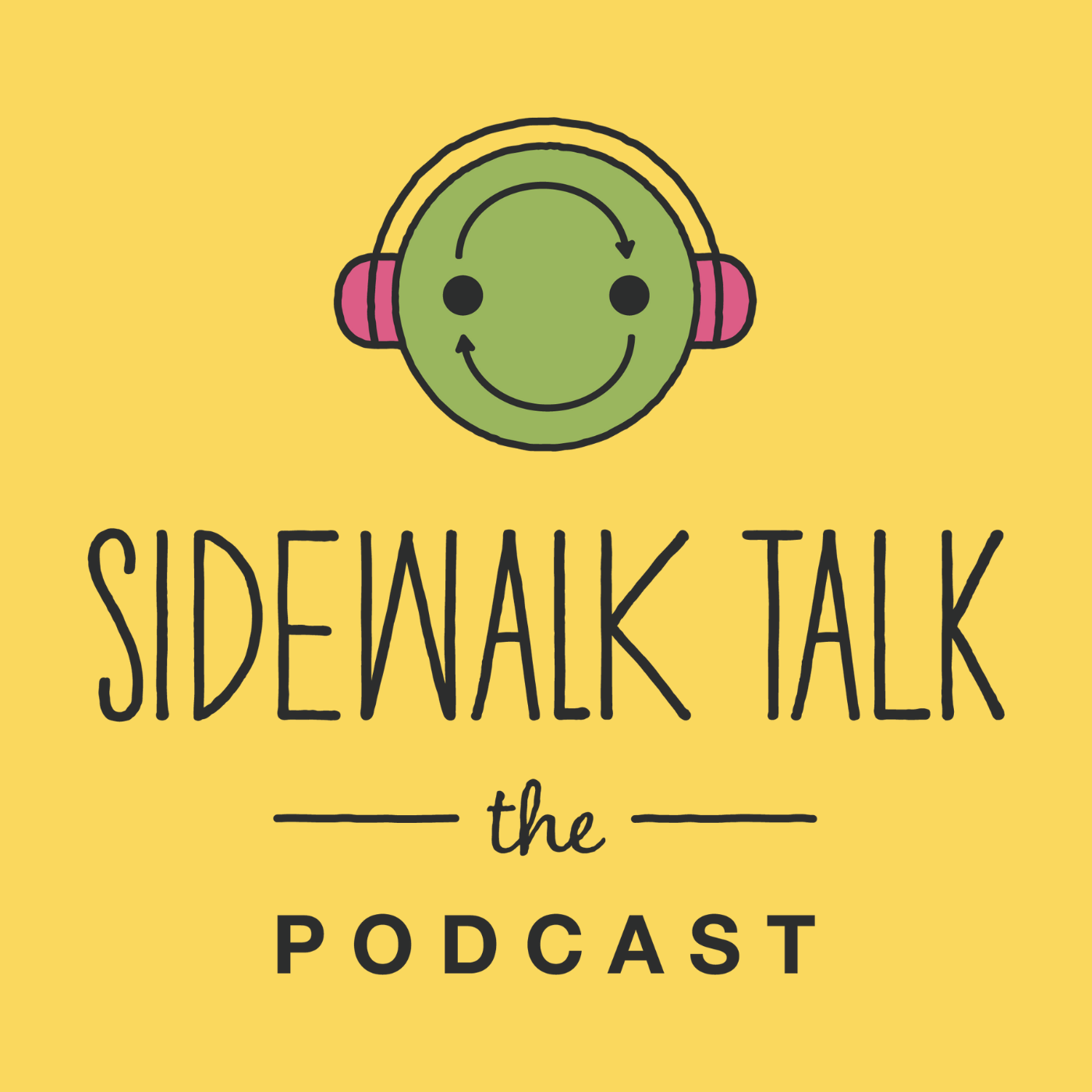
In a world that loves to talk, do, achieve, promote, preach, sell....what does it mean to connect, be, and listen. A podcast about #humanconnection #mentalhealth #socialhealth #empathy #belonging and #loneliness. And always thinking about justice and inclusion in all things. Join us. And share far and wide. Or start your own chapter of Sidewalk Talk in your community. www.sidewalk-talk.org
Episodes
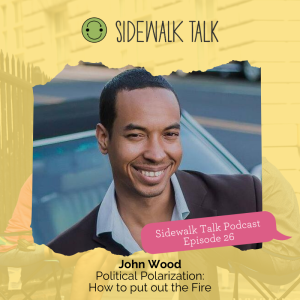
Monday Mar 23, 2020
Better Angels is Putting Out the Political Polarization Fire | John Wood
Monday Mar 23, 2020
Monday Mar 23, 2020
How do you speak truth from a place of love and compassion? Gift yourself the tools you need to bridge racial, economical and political gaps with today's episode, featuring John Wood of the Better Angels organization.
The biracial son of two culturally and economically opposite parents, John Wood has spent the better part of his life connecting across categories. The former Vice-Chairman of the Republican Party of Los Angeles County and nominee for congress, now works as a national leader for Better Angels- a grassroots organization uniting political parties and opposing populations around the country, founded by internationally renowned therapist, Dr. Bill Doherty.
John shares some of his background, and the philosophies that guide his life and work with Better Angels. Hear his profound ideas around communicating love and compassion through empathetic speech. Drawing inspiration from non-violent leaders like Martin Luther King, John doles out insights and offers surprising suggestions about the type of conversational discipline we all should develop to fight against the active efforts to divide us.
Find extended notes at sidewalk-talk.com/podcast.
Connect:
Find | Sidewalk Talk Podcast
On Instagram: @sidewalktalkorg
On Twitter: @sidewalktalkorg
Find | Traci Ruble
On Instagram: @TraciRubleMFT
On Twitter: @TraciRubleMFT
On Facebook: @TraciRubleMFT
Find | John Wood, Jr. and Better Angels
On Instagram: @betterangelsusa
On Twitter: @BetterAngelsUSA
On Facebook: @BetterAngelsUSA
SUBSCRIBE TO THIS PODCAST
On Spotify
On Spotify
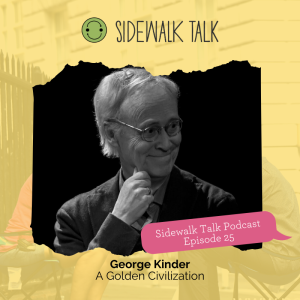
Friday Mar 13, 2020
A Golden Civilization | George Kinder
Friday Mar 13, 2020
Friday Mar 13, 2020
How do we ensure the structures and institutions within our lives reflect the values that we know to be true and good? What would it look like if we were to achieve a Golden Civilization devoid of the harmful tendencies we engage in daily?
George Kinder, known well for his work in financial life planning and spiritual practice combines the two in his latest work, A Golden Civilization & The Map of Mindfulness. He dives heart first into a conversation with Traci on what it would mean to approach transactions with the same mindfulness that governs our everyday lives. Listen in to hear George’s insights on defining and achieving freedom, independence. He shares the importance of taking action in all aspects of our lives, from quiet moments of meditation to vocal political movements.
Connect:
Find | Sidewalk Talk Podcast
On Instagram: @sidewalktalkorg
On Twitter: @sidewalktalkorg
Find | Traci Ruble
On Instagram: @TraciRubleMFT
On Twitter: @TraciRubleMFT
On Facebook: @TraciRubleMFT
Find | George Kinder
On Instagram: @george_kinder
On Twitter: @GeorgeDKinder
On Facebook: @GeorgeDKinder
SUBSCRIBE TO THIS PODCAST
On Spotify
On Spotify
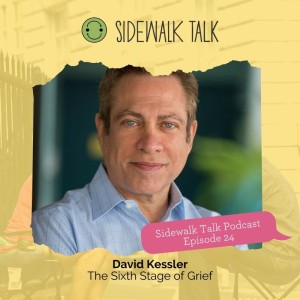
Monday Mar 09, 2020
The Sixth Stage of Grief | David Kessler
Monday Mar 09, 2020
Monday Mar 09, 2020
The path to navigating loss and grief, became illuminated when David Kessler and Elisabeth Kubler-Ross wrote On Grief and Grieving, giving us the five stages of grief most of us are familiar with. Today, he expands and recenters this renowned concept with the release of his new work, Finding Meaning.
David sits down with Traci and talks about his journey to the field of thanatology. He shares how the loss of his mother as a child and the sudden death of his 21-year-old son have shaped his life and the way he continues through the world. They explore how we can best support those in our lives that are experiencing grief while ensuring our own well being. Learn the impact finding meaning can have on what remains after collective loss, the end of a relationship or the loss of a loved one.
Connect:
Find | Sidewalk Talk Podcast
On Instagram: @sidewalktalkorg
On Twitter: @sidewalktalkorg
Find | Traci Ruble
On Instagram: @TraciRubleMFT
On Twitter: @TraciRubleMFT
On Facebook: @TraciRubleMFT
Find | Davis Kessler
At Grief.com
On Instagram: @iamdavidkessler
On Twitter: @iamdavidkessler
On Facebook: @iamdavidkessler
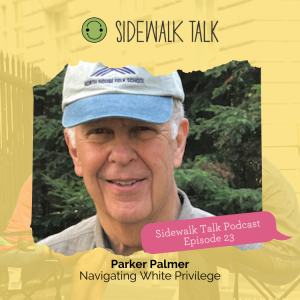
Monday Mar 02, 2020
Parker Palmer On Navigating White Priviledge
Monday Mar 02, 2020
Monday Mar 02, 2020
When it comes to privilege- knowing the difference between righteous and self-righteous speech can make all the difference when you’re communicating what's in your heart.
Today, I’m joined by Parker Palmer— nationally recognized educator, author and social change activist. He shares his thoughts on white privilege and how it can inhibit our connections when left unconfessed. We discuss the work of Ibram Kendi and explore what it means to be an anti-racist.
Episode Timeline:
- [00:09] Intro
- [00:58] Meet Parker Palmer
- [02:18] His passion for connection
- [03:31] Parker’s recent projects and new book
- [06:22] Being selective about his time and energy
- [07:50] Connecting across racial lines
- [11:54] Post 2016 elections- have things gotten worse?
- [14:15] White privilege and how we indict ourselves
- [21:03] Ibram Kendi’s thoughts on racism
- [22:14] White supremacy comes in many forms
- [27:25] Inevitable mistakes in our efforts to be anti-racist
- [30:31] Collaboration and power
- [36:39] Parker Palmer's advice for you
- [39:43] Outro
Resources Mentioned:
- The Center for Courage and Renewal
- On the Brink of Everything by Parker Palmer
- Let Your Life Speak by Parker Palmer
- A Hidden Wholeness by Parker Palmer
- How to Be an Antiracist by Ibram X. Kendi
Standout Quotes:
- “We must take this impulse to be connected and use it to connect across those lines because that's where the learning is. That's where the juice is.” - Parker Palmer [11:36]
- “We have to have not only conversation, and which includes listening and speaking across racial lines or other lines of divide. We need to have conversations within our own tribe.” - Parker Palmer [19:40]
- “My work, our work the Center for Courage and Renewal's work is, is the kind of conversation where people can listen at a level of depth where they suddenly find themselves saying, whoa, I, this other person is talking about themselves, but I just learned something about myself. And that those are precious, precious conversations.” - Parker Palmer [27:00]
- “We miscalculate how we come into power... Power is not something that we hold as individuals. Power is something that we generate collectively as all of the great social movements have proven.“ - Parker Palmer [32:26]
- “I think one of the greatest wounds that we find around the Earth is people who feel unseen, unheard and unappreciated. That's a very painful life to live. You know, ‘here I am. Nobody sees me, nobody hears me, nobody appreciates what I do,’ and there are millions, millions and millions of people who show up every day and to all kinds of settings who have that. - Parker Palmer [34:22]
Connect:
Find | Sidewalk Talk Podcast
On Instagram: @sidewalktalkorg
On Twitter: @sidewalktalkorg
Find | Traci Ruble
On Instagram: @TraciRubleMFT
On Twitter: @TraciRubleMFT
On Facebook: @TraciRubleMFT
Find | Parker Palmer
On Twitter: @parkerjpalmer
On Facebook: @parkerjpalmer
SUBSCRIBE TO THIS PODCAST
On Spotify
On Spotify
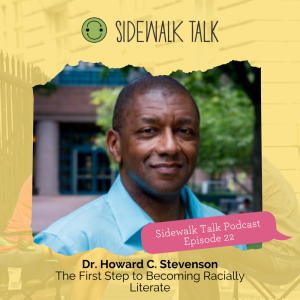
Monday Feb 24, 2020
The First Step In Becoming Racially Literate | Dr. Howard C. Stevenson
Monday Feb 24, 2020
Monday Feb 24, 2020
With racism embedded throughout American history, policy, and systems- how do we connect and get started on the conversations that can bring us all closer?
In this episode of the Sidewalk Talk podcast, I sat down with Dr. Howard C. Stevenson, renowned psychologist and professor at the University of Pennsylvania, who is shining a guiding light on the importance of racial literacy. Dr. Stevenson and his brother, Bryan Stevenson have ignited some of the most desperately needed conversations on race in America. Join us as he shares why acknowledging the narratives of others and taking steps toward combating hate start with falling deep in love with your own narratives.
Episode Timeline:
- [00:07] Intro
- [00:57] Meet Dr. Howard C. Stevenson
- [02:39] How he got to where he is today
- [06:39] What's changed
- [07:05] Changes in race politics & his mission
- [10:47] Dehumanization and a shift in the moral code
- [12:38] Using history and culture to counter hateful narratives
- [15:48] Supporting other narratives through listening
- [17:42] Calculating, locating and communicating as you listen
- [20:51] Knowing your own story
- [22:59] Therapy across cultures
- [24:15] Racial literacy's impact on power dynamics
- [28:40] What is a story?
- [31:51] Dr. Stevenson’s wishes for you
- [33:41] Outro
Resources Mentioned:
Standout Quotes:
- “If you share a story with me, you're inviting me into your life. Even if I could be an enemy in your story...it is human in its core that you're gonna be vulnerable, then expect me to also be vulnerable. So I would argue that it's spiritual as much as it is strategic to share and know your own story. It's an act of humanity in and of itself. And then I think we can define you know, what's, what's possible between us.” - Dr. Stevenson [22:20]
- “In our work, our job is to help you fall in love with your own story. That means we also have to appreciate our own.” - Dr. Stevenson [26:54]
- “We always used to say, it takes a village to raise a child to help the child. But we've been saying, even if that's the case, what does it take to raise a healthy village? - Dr. Stevenson [14:05]
- “There is in our work a certain humbling, I would argue- holy ground- where people are sharing with us the most intimate things in their lives. But it could be, without humanity, it could be voyeurism, right? We could be simply watching other people struggle or grow or whatever. And that's a particular space of power. And I would argue that it's hard to talk about humanity, you have to be human and some respects that means sharing.” - Dr. Stevenson [20:59]
Connect:
Find | Sidewalk Talk
On Instagram: @sidewalktalkorg
On Twitter: @sidewalktalkorg
Find | Traci Ruble
On Instagram: @TraciRubleMFT
On Twitter: @TraciRubleMFT
On Facebook: @TraciRubleMFT
Find | Dr. Howard C. Stevenson
On Instagram: @hcstevensonjr
On Twitter: @DrHoward_RECAST
SUBSCRIBE TO THIS PODCAST
On Spotify
On Spotify
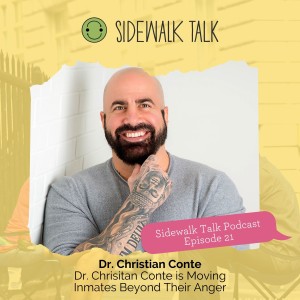
Tuesday Feb 18, 2020
Dr. Christian Conte is moving Inmates beyond their Anger
Tuesday Feb 18, 2020
Tuesday Feb 18, 2020
Can anger be productive? Is it possible that the moments where we feel the least in control may offer us the most opportunities for growth?
In today’s episode, I’m joined by Dr. Christian Conte, author and licensed counselor. He’s spent over 20 years working in the jail and prison system, helping inmates to work through their anger and move towards transforming their lives. Dr. Conte shares the magic of the yield theory and practical approaches we can all take to make genuine connections with the people we meet. Listen in as we explore it all— guided by the concepts in his latest book, Walking Through Anger.
Episode Timeline:
- [00:07] Intro
- [00:58] Meet Dr. Christian Conte
- [03:00] The value of authenticity
- [05:46] Understanding the type of person he wanted to be
- [07:19] What shaped Dr. Conte
- [11:01] Does anger have value?
- [13:52] What could your anger teach you?
- [15:51] Wiping away judgment and working in Max security prisons.
- [18:46] How is yield theory affecting change?
- [20:24] How does yield theory work to shift anger
- [24:12] Humble listening and creating connections with wonder
- [27:56] How our energy impacts others
- [29:21] Why down to earth, practical strategies work
- [30:58] Compassion and the importance of consequences
- [32:54] Dr. Christian Conte's advice for you
- [38:12] We are the source and solution to our problems
- [39:03] Outro
Resources Mentioned:
Standout Quotes:
- “ I don't need to put on a facade for people. It doesn't matter what I look like, [what] matters [is] what I'm saying. If what I'm saying doesn't resonate with you- throw it away. If it does, let's move forward with it.“ - Dr. Christian Conte [32:09]
- “When I have the humility, to not only remove some of my bias out of the way and let myself be utterly surprised by people, that also creates the sweetness of the connection...I'm in this constant state of delight. Of wonder.” -Traci Ruble [24:41]
- "What approaching someone with genuineness and humility does is it circumvents. It gets around the fight or flight response." - Dr. Conte [26:48]
- "When we can have the compassion to look beyond defining ourselves by our actions and see that we're more than that. Now, we can create new meaning from this moment forward - Dr. Conte [38:44]
Connect:
Find | Sidewalk Talk Podcast
On Instagram: @sidewalktalkorg
On Twitter: @sidewalktalkorg
Find | Traci Ruble
On Instagram: @TraciRubleMFT
On Twitter: @TraciRubleMFT
On Facebook: @TraciRubleMFT
Find | Dr. Christian Conte
On Instagram: @Drchristianconte
On Twitter: @Dr.Conte
SUBSCRIBE TO THIS PODCAST
On Spotify
On Spotify
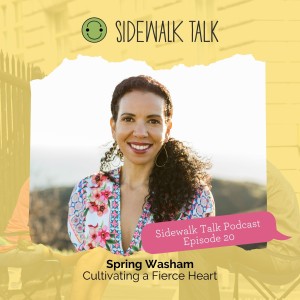
Tuesday Feb 11, 2020
Cultivating a Fierce Heart | Spring Washam
Tuesday Feb 11, 2020
Tuesday Feb 11, 2020
“All are welcome”— a warming phrase that is often implied, but rarely spoken aloud. In the new book A Fierce Heart, meditation and dharma teacher Spring Washam, shares her journey of sharing Buddhist philosophies of mindfulness, wisdom, loving-kindness and compassion in a radically inclusive way.
In this episode of the Sidewalk Talk podcast, Spring sits down with me to talk about the vision behind her book and the East Bay Meditation Center, a diverse spiritual hub she founded in Oakland, California. Listen in as she shares her journey to where she is today and lessons learned from her teachers including, Jack Kornfield and Alice Walker. We talk about what it means to cultivate A Fierce Heart and why seeing and being seen are essential for establishing meaningful connections.
Episode Timeline:
- [00:05] Intro
- [00:54] Meet Spring Washam
- [03:09] The inspiration for her book, A Fierce Heart
- [04:28] How she found her place in Buddhism
- [06:56] Welcoming more diverse communities to the dharma
- [09:01] Are practices like this really solving any of the big problems?
- [12:20] How cultivating a fierce heart and sitting still ripples out
- [17:42] Sitting with things and metabolizing pain
- [20:05] Her start on her shamanic journey and plant spirit medicine
- [24:15] Honoring the roots of a practice while sharing it with others
- [26:35] How her work impacts her day to day life
- [28:52] How these practices have impacted the way she relates
- [34:08] Spring Washam’s wishes for you
- [35:47] Outro
Resources Mentioned:
Standout Quotes:
- “So the fierce heart is also the heart that in the midst of it can also let go of it all and see this as a moment in time of pain and confusion, but also there's this joy undercurrent, that's really what gives you the capacity to be fierce, right, is that you have this faith and there's joy under it.“ - Spring [32:09]
- “...what you're doing is you're creating the fertile soil for impact. Right? You said we have to work with our greed, hatred, and delusion, in order to have what I imagine is true impact… we have to have that fertile soil so that the impact isn't coming from ego or is it coming from something that's going to harm the planet or harm or dehumanize other groups of people -Traci [11:01]
- “You know, it's connecting on that human level. So it's a lot about listening. But there's also something about finding the joy in it, that everything can get really, really heavy, but at the same time, there can be this joy of just being together and looking at each other's eyes and being like, ‘what a ride, huh?’” -Spring [29:32]
Connect:
Find | Sidewalk Talk
On Instagram: @sidewalktalkorg
On Twitter: @sidewalktalkorg
Find | Traci Ruble
On Instagram: @TraciRubleMFT
On Twitter: @TraciRubleMFT
On Facebook: @TraciRubleMFT
Find | Spring Washam
On Instagram: @SpringWasham
On Twitter: @SpringWasham
On Youtube: @Spring Washam
SUBSCRIBE TO THIS PODCAST
On Spotify
On Spotify
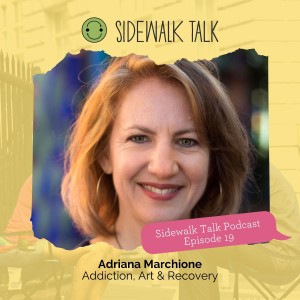
Tuesday Feb 04, 2020
Addiction, Art & Recovery | Adriana Marchione
Tuesday Feb 04, 2020
Tuesday Feb 04, 2020
When Adriana Marchione released, When The Fall Comes, she opened our eyes to how dance, poetry and performance could guide us through enormous grief. Today, she sits down with me to talk about the things that came first; what happened before her short film and the birth of her thriving therapy practice— her own story of recovering from addiction. The motivation and inspiration for her upcoming film, The Creative High.
Adriana helps hundreds of people through her art and therapy practice, supporting them as they heal from grief, addiction and illness. As an expressive arts therapist, she takes a creative approach to recovery. Listen in as she shares how creating can serve as a container for pain and the ways art can not only help us to heal but also teach us a whole new way of seeing and communicating with one another.
Episode Timeline:
- [00:05] Intro
- [00:53] Meet Adriana Marchione
- [02:36] How she is integrating healing into her work
- [06:40] Getting out of her head and into her body
- [08:34] Art is a learned language
- [10:03] Opening up to connect with others and yourself
- [12:39] Unmasking and seeing people more fully
- [16:25] Art and channeling creativity
- [26:40] Leaning into pain, creatively
- [35:18] Amplifying joy with art
- [39:14] Adriana’s suggestion for you
- [42:39] Outro
Resources Mentioned:
Standout Quotes:
- “I feel very in awe of the fact that there has been this one thread that's kind of carried me through, you know, and I've supported so many people throughout the years with addiction. And first I had to hit my own bottom and find my own process of recovery. Art was a big part of that.” - Adriana [4:53]
- “It's a learned language. Everyone's creative, but It's just about finding ways to express yourself and learning that even simple things simple tools can get you pretty far with art.” - Adriana [8:57]
- “What's coming to mind right now, is that in a way, [art] opens us to some other aspects of connecting... if you change the language, you change the quality of the connection as well. -Traci [10:03]
- “It's not always about regulating a hurt or suppressing a bad feeling that sometimes, and maybe we're I mean, maybe we are all looking to be more alive, aren't we?” - Traci [20:45]
- “...But I feel like there's an element of organically listening in that way. Right? Not trying to force somebody to feel more alive if they feel really flat, but that there tends to be this way in which in the human interaction, we're co-creating more aliveness this together.” -Traci [23:43]
- I always like when people make friends with the shadowy things that we do… it's a great model and example for the rest of us to keep listening more deeply rather than hearing the sickness; hearing for the wholeness in people. - Traci [24:47]
Connect:
Find | Sidewalk Talk Podcast
On Instagram: @sidewalktalkorg
On Twitter: @sidewalktalkorg
Find | Traci Ruble
On Instagram: @TraciRubleMFT
On Twitter: @TraciRubleMFT
On Facebook: @TraciRubleMFT
Find | Adriana Marchione
On Instagram: @adrianamarchione
On Twitter: @Marchione68
On Facebook: @Adriana.marchione
SUBSCRIBE TO THIS PODCAST
On Spotify
On Spotify
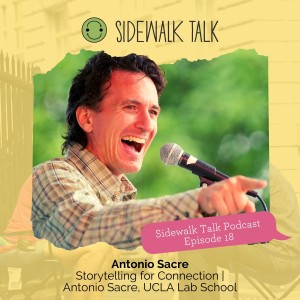
Tuesday Jan 28, 2020
Storytelling for Connection | Antonio Sacre, UCLA Lab School
Tuesday Jan 28, 2020
Tuesday Jan 28, 2020
Storytelling. An oldie, but a goodie. So good in fact, that Antonio Sacre— author-in-residence at the UCLA Lab School— has used it to connect children and adults alike to their cultures, identities and possibly most importantly, to each other.
Antonio Sacre’s approach to life is one with an emphasis on creating memories and remaining present. In sharing his own personal narratives and invented stories, he has been able to preserve his family’s history while offering a unique, human relatability that’s proven itself universal.
In today’s episode of the Sidewalk Talk podcast, Anthony and I talk about the link between listening and storytelling. Listen in to learn how he is using the power of story to create meaningful human-to-human connections and promote a sense of belonging.
Episode Timeline:
- [00:57] Intro
- [00:57] Meet Antonio Sacre
- [02:42] How he got his start with stories
- [04:57] Antonio’s storytelling at the UCLA lab school
- [12:39] The influence of family on his storytelling
- [17:47] Promoting a sense of belonging in children
- [20:06] The foundation of a story and the power of transformation
- [27:30] Creating memories and living a storied life
- [31:24] Motivating with stories
- [34:17] Antonio Sacre’s storytelling class
- [38:15] A reminder and message of gratitude
- [41:27] Outro
Resources Mentioned:
- Professional Development Live-Stream Events
- A Mango in the Hand by Antonio Sacre
- My Name is Cool by Antonio Sacre
Standout Quotes:
- "So they're listening to my story. They're thinking of their own story. And this community is created in a way that existed a lot pre-technology and doesn't exist as much post technology..” - Antonio [11:08]
- “It started resonating with kids...really helping kids understand their cultural backgrounds or languages— their specific stories are valid." - Antonio [17:21]
- "There's something beautiful about you, in particular, Antonio as a storyteller, because you bring this selfhood into being in a way for kids that maybe feel like they have to put a part of themselves away." - Traci [18:09]
- “...the TV is interesting, but the TV can't see us.” - Antonio [33:07]
- “Bring the sidewalk into your own homes. What happens when you listen to your own children and your own siblings and your own elders? And yourself?” - Antonio [40:23]
Connect:
Find | Sidewalk Talk
On Instagram: @sidewalktalkorg
On Twitter: @sidewalktalkorg
Find | Antonio Sacre
On Instagram: @antoniosacre
On Twitter: @antoniosacre
On Facebook: @AntonioSacreAuthor
SUBSCRIBE TO THIS PODCAST
On Spotify
On Spotify
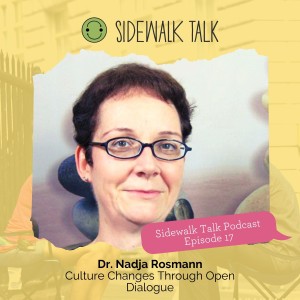
Monday Jan 20, 2020
Monday Jan 20, 2020
What do your opinions have to do with spirituality? Turns out when we enter a conversation only looking to share what we know, we miss out on the mystical potential that comes from opening up to what we do not know in dialogue. An editor of Evolve Magazine in Germany and Cultural Anthropologist, Dr. Nadja Rosmann shares how connection and dialogue liberate the human spirit into possibility.
Biography:
Dr. Nadja Rosmann has been a member of the evolve editorial team since October 2014. Nadja is a cultural anthropologist with a focus on identity research. She works as a journalist, communication consultant and scientific project manager primarily on topics from the fields of business and spirituality and operates the think.work.different weblog.
Quotes Worth Sharing:
- Performance culture has a destructive impact on humans.
- When people feel isolated, they feel like they have to fight for themselves to survive.
- Connection is the aliveness in any living organism. You wouldn’t ask a tree why he is standing there and growing just like you wouldn’t ask why it is important for people to connect.
Show Notes:
There are so many systemic structures in our work organizations to improve individual performance but not to connect people inside those organizations. Companies want more productivity but the systems they create to produce more create also more isolation. But more isolation creates less productivity.
The real solution is we must change the structures within which we live and work.
Connection is a sphere you shouldn’t try to observe from just functionality. Connection is aliveness like in nature or any living organism. You would ask a tree why he is standing there and growing just like you wouldn’t ask why it is important for people to connect.
The entry points to cultural change and human well being might be different than what we used to think. And this is also a very spiritual perspective. You have to trust in something greater than just what is functional. We simply have to explore, experiment, and experience it.
At the same time, the process of connecting doesn’t leave behind thinking, it just puts it into a different context. Opening oneself up, being more transparent, makes us more aware of our human fragility. If you can see in one other person’s eyes the same fragility you sometimes suffer from you connect on a completely different level and then realize that we are all connected.
We all are hiding, in a way, with fake smiles or stoic distance because we are still looking for better ways to connect but we don’t know how.
Sharing our fragility really needs time because we are just at the beginning of how to learn this.
Evolve Salons creates a space where you don’t have to get too personal. Getting too personal is not our main interest. Sometimes if we are getting too personal we expect something back. But our focus in on just opening up in the dialogue, not getting a response back. And we have to be aware of how profound this is – a real cultural shift - because there really are no places to have an experience like this. And you can’t really know it but let it come in through the back door through experiencing it.
You kind of have to trust that between human beings there is an unknown potential and trust – trust and try.
No one is doing anything in the dialogues we structure for Evolve Magazine. We are only holders of the space. We are just helping others feel and become aware of the space they are inhabiting and the potential and resonance between two people.
What creates more opening in dialogue?
- Being interested in what you don’t know yet. Often we think our contribution to any dialogue is to contribute what we know. But it limits us to what we already know.
- Listen to what and how people are speaking but also very present for the potential in the space between you and I. We have to allow for the landing of our words but the unfolding of our connection. I cannot worry about where this content leads.
What closes dialogue down?
- Insisting on opinions – your opinions.
- Insisting on your own agenda.
It is very limiting to the potential in dialogue to try to occupy a space with your own agenda. It can get quite mystical and spiritual, when you consider not doing this. We have to be free enough to not stay so long in one’s own thoughts so we can connect to another’s thoughts. It is the land of no-self.
Meditation helps to get into the listening mindset. If you can sit for awhile on a cushion and just open up - it is easier to remember this inner gesture when we are in dialogue.
And I do fail at this listening. But we need to get rid of these feelings of guilt and shame when it comes to failure because failure is the best teacher of all. Especially when it comes to listening and dialogue there will never be a space where we totally have it right. If we think we do then we aren’t listening any more.
To find more info about Nadja’s work and Evolve Magazine
One World Dialogue https://oneworldindialogue.com/
Visit Dr. Nadja Rossmann’s Blog: http://www.zenpop.de/blog/
Evolve Magazine: https://www.evolve-magazin.de/

We hope you enjoyed this dialogue with Dr. Rosmann. As Sidewalk Talk has doubled in size since February of 2019 to today, we need monthly supporters to keep us providing free listening on sidewalks. Upcoming and past guests include Harville Hendricks, Spring Washam, Parker Palmer, Charlie Easmon, David Kessler, George Kinder, Howard C. Stephenson, and Ashanti Branch and the list goes on. You can invest here or please share this conversation with all those who would be lifted up by it.
